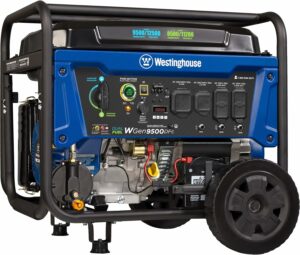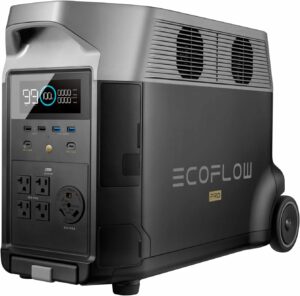Choosing the Right Generator Size for Your Central Air System
Introduction
For homeowners, the comfort of a climate-controlled home is often taken for granted until a power outage disrupts the tranquility.
Central air systems, essential for maintaining a pleasant indoor environment, rely on a consistent power supply.
To ensure that your home remains relaxed and comfortable even when the grid goes down, selecting the right generator size becomes a paramount consideration.
In this guide, we will explore the key steps and considerations for “Choosing the Right Generator Size for Your Central Air System.”
Provo Green Products embodies a beacon of trust in the realm of sustainable discoveries, offering choices that enhance your life and leave a positive mark on our planet.
Leveraging extensive expertise in manufacturing, construction, and various trades, we provide a solid foundation for sustainable living.
Our meticulous research process guarantees that our information about each product is precise and current, allowing you to make informed decisions.
Whether your interest lies in solar products, electric bikes, or other eco-friendly alternatives, our commitment to credibility ensures you have access to dependable insights, guiding your journey toward a more sustainable lifestyle.
Provo Green Products is your go-to destination for finding the right green products for your lifestyle.
Disclosure: As an Amazon Associate, we may earn from qualifying purchases. This does not affect the product pricing whatsoever.
Understanding Your Central Air System’s Power Requirements
When selecting the right generator size for your central air system, the first and most crucial step is understanding the power requirements of your HVAC unit.
Central air conditioners can be power-hungry appliances, and miscalculating their electrical needs can lead to an inadequate power backup or an oversized generator that’s unnecessary.
Here are the key aspects to consider when delving into this important topic:
- Determining the Electrical Needs of Your Central Air Conditioner:
- The central air system’s electrical requirement is typically measured in watts (W) or kilowatts (kW). To find this information, you can:
- Refer to the unit’s manufacturer specifications and documentation, which often provide the power consumption details.
- Check the nameplate or data tag on your central air conditioning unit. This label lists the unit’s electrical specifications, including voltage, amperage, and wattage requirements.
- The central air system’s electrical requirement is typically measured in watts (W) or kilowatts (kW). To find this information, you can:
- Components and Specifications to Consider:
- Your central air conditioner comprises several components that collectively impact power consumption. Consider these factors:
- Compressor: The compressor is a significant power draw during startup. Please pay attention to its voltage and amperage requirements.
- Fan Motor: Both indoor and outdoor fan motors contribute to power consumption. Ensure you note their specifications.
- Air Handler: The air handler and blower motor also require electricity to distribute conditioned air throughout your home.
- Voltage: Central air systems typically operate on 120V, 240V, or 208V power supplies, so it’s vital to understand the voltage requirements.
- Your central air conditioner comprises several components that collectively impact power consumption. Consider these factors:
It’s important to highlight that calculating the power requirements of your central air conditioner is not just about its running wattage but also the starting wattage, often referred to as surge or peak wattage.
The starting wattage is higher because the compressor and other components require extra power during startup.
Neglecting this aspect can lead to an undersized generator that struggles to handle the initial power surge.
By thoroughly understanding your central air system’s power requirements, you can make an informed decision about the generator size needed to ensure uninterrupted cooling during power outages.
Accurate calculations are essential to prevent generator overloading or damaging your HVAC unit.
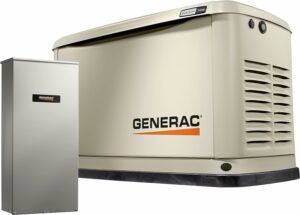
Sizing a Generator for Your Specific Air Conditioning Unit
Selecting the right generator size for your central air conditioning unit is a critical step in ensuring that you have a reliable backup power source during outages.
This process involves calculating the appropriate generator capacity to meet the unique needs of your HVAC system.
Here’s a detailed breakdown of how to go about it:
- Calculating the Starting and Running Wattage for Your AC:
- Running Wattage: This represents the continuous power consumption of your central air conditioner when it’s running at total capacity. To find this value, refer to the manufacturer’s specifications or the data tag on your AC unit. It’s important to note that the running wattage is lower than the starting wattage.
- Starting Wattage (Surge Wattage): This is the additional power required by your air conditioner when it initially turns on. It’s significantly higher than the running wattage and is essential when sizing the generator. To determine this, you can follow these steps:
- Check the AC unit’s documentation for the starting wattage information.
- If not available, calculate it based on the locked-rotor amperage (LRA) or the locked-rotor current (LRC) of the compressor, which is usually mentioned on the data tag. Multiply this by the voltage to get the starting wattage.
- Tips for Accurately Measuring Power Consumption:
- Consult an Electrician: If you need clarification on calculating the power requirements independently, it’s a wise idea to consult a licensed electrician. They have the expertise to ensure precise calculations.
- Consider Peak Load: Other household appliances and devices may also be used when the air conditioner starts. To account for this, factor in the peak load on your electrical system and generator.
- Room for Expansion: When sizing your generator, it’s a good practice to choose a model with a slightly higher capacity than the absolute minimum required for your central air system. This provides some flexibility and ensures that your generator can handle additional loads.
- Environmental Factors: Climate and local weather conditions can influence your air conditioner’s starting and running wattage. Extremely hot or cold temperatures can affect its efficiency and power requirements.
Selecting a generator that matches the combined starting and running wattage of your central air conditioning unit is crucial to ensure it operates seamlessly during power outages.
An accurately sized generator not only protects your HVAC system but also provides power for other essential appliances, creating a more comprehensive backup solution for your home.
Exploring Different Types of Generators
When choosing the right generator for your central air system, you’ll encounter various options.
Understanding the different types of generators and their advantages and disadvantages is essential for making an informed decision.
Here’s an in-depth exploration of the options available:
Portable Generators:
- Advantages:
- Portability: These generators are designed for easy transport and can be used in various locations around your property.
- Cost-Effective: Portable generators are generally more budget-friendly compared to standby models.
- Easy Setup: They are relatively simple to set up and use, making them accessible for homeowners.
Disadvantages:
- Manual Operation: Portable generators need to be started manually during power outages, which may not be convenient during the night or when you’re away from home.
- Limited Power: These generators have lower power output than standby models, making them suitable for powering essential appliances rather than your entire home.
Standby Generators:
- Advantages:
- Automatic Operation: Standby generators are designed to turn on automatically when they sense a power outage, ensuring uninterrupted power for your central air system and other essential circuits.
- High Power Capacity: These generators can provide enough power to run your home, including your air conditioner.
- Long-Term Solution: Standby generators are typically built to last and can offer years of reliable backup power.
- Disadvantages:
- Higher Cost: Standby generators are a more significant investment than portable models, both in terms of initial purchase and installation.
- Professional Installation: They require professional installation by a licensed electrician, which adds to the overall cost.
Inverter Generators:
- Advantages:
- Quiet Operation: Inverter generators are known for their quiet and efficient operation, making them suitable for residential use.
- Clean Power: They produce clean and stable electricity, essential for sensitive electronics and appliances.
- Fuel Efficiency: Inverter generators are fuel-efficient and often come with eco-mode settings to conserve fuel when the load is low.
- Disadvantages:
- Limited Power: Inverter generators are typically smaller and have lower power output, which may need to be increased to run a central air system and other appliances.
Dual-Fuel Generators:
- Advantages:
- Fuel Flexibility: Dual-fuel generators can run on gasoline and propane, offering flexibility and backup fuel options.
- Extended Runtime: Propane often provides a longer runtime than gasoline, which can be beneficial during prolonged outages.
- Lower Emissions: Propane is considered a cleaner-burning fuel, resulting in reduced emissions.
- Disadvantages:
- Cost: Dual-fuel generators can be more expensive than single-fuel options.
- Additional Equipment: Using propane requires a propane tank and infrastructure, which may be limited for some homeowners.
Choosing the correct type of generator depends on your specific needs, budget, and preferences.
Each type has its advantages and limitations, so please carefully consider your priorities and the requirements of your central air system when making your choice.
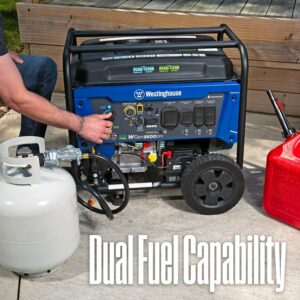
Considerations for Backup Power During Outages
When it comes to ensuring that your central air system continues to operate during power outages, several important considerations come into play.
It’s crucial to plan for backup power effectively.
Here’s a detailed exploration of these considerations:
- Identifying the Duration and Frequency of Power Outages in Your Area:
- Start by researching the historical data on power outages in your region. Understanding how frequently outages occur and their typical duration can help you gauge the level of backup power, you’ll need.
- Consider the seasons: Some areas may experience more outages during certain seasons, such as extreme weather conditions or storms.
- Choosing the Right Generator Capacity:
- As previously discussed, selecting the correct generator capacity is vital. Ensure the generator can provide enough power to run your central air system and other essential appliances during outages.
- Overloading the generator can lead to performance issues, damage, and potential hazards. Conversely, you may need more than an undersized generator to meet your power needs.
- Ensuring Uninterrupted Power for Your AC Unit:
- For central air systems, opting for a standby generator with automatic transfer switches is often the best choice. These systems automatically start the generator when a power outage is detected, ensuring seamless and uninterrupted cooling for your home.
- If you use a portable generator, consider investing in a manual transfer switch to connect your AC unit directly to the generator. This ensures that your air conditioner receives power when needed without overloading the generator.
- Fuel Availability and Storage:
- Make sure you have a reliable and sufficient supply of fuel for your generator. Depending on the generator type (gasoline, propane, diesel), fuel availability can vary. It’s crucial to store fuel safely and consider options for refueling during extended outages.
- Consider the convenience and safety of fuel storage, especially for larger generators that may require substantial fuel reserves.
- Maintenance and Testing:
- Regular generator maintenance is essential to ensure its functionality during an outage. This includes checking fuel levels, changing the oil, and replacing spark plugs and filters.
- Periodically test your generator to ensure it starts and operates correctly. This practice helps identify any issues before an actual power outage occurs.
- Environmental Considerations:
- Be mindful of the environmental impact of your generator. Some models, such as inverter generators, are known for their low emissions and fuel efficiency.
- Consider noise levels, especially if you have neighbors nearby. Quieter generator options may be preferred in residential areas.
- Compliance with Local Codes and Regulations:
- Check your local building codes and regulations regarding generator installation, noise limits, and fuel storage. Ensure that your backup power setup complies with these guidelines.
By carefully considering these factors, you can create a reliable backup power plan that ensures your central air system operates smoothly during power outages, keeping your home comfortable regardless of the circumstances.
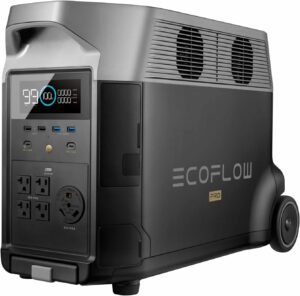
Professional Installation and Maintenance
Proper installation and regular maintenance of your generator system are vital to ensure it functions reliably and safely during power outages.
Here’s a more detailed exploration of the importance of professional installation and ongoing maintenance:
- Hiring an Electrician for Safe Generator Setup:
- Generator installation is not a DIY project. It’s crucial to hire a licensed electrician who specializes in generator installations. They have the expertise and experience to ensure your generator is set up correctly and complies with local building codes.
- The electrician will assess your home’s electrical system, determine the best location for the generator, and install the necessary components, including automatic transfer switches, to facilitate seamless power transfer during outages.
- Compliance with Safety Standards:
- Professional installation ensures your generator system meets safety standards and adheres to local regulations. This is essential to protect your home, family, and community from potential hazards.
- The electrician will ensure proper grounding, exhaust ventilation, and electrical connections, reducing the risk of electrical faults and carbon monoxide exposure.
- Generator Sizing and Load Management:
- An experienced electrician can accurately size the generator to meet your specific power requirements, preventing overload issues and safeguarding the longevity of the generator.
- They can also implement load management strategies to prioritize essential circuits and appliances, including your central air system, during power outages. This helps to optimize the use of available generator power.
- Regular Maintenance to Keep Your Generator and AC System in Top Shape:
- Generators require routine maintenance to ensure they are in working order when needed. This includes checking fuel levels, changing oil and filters, inspecting electrical connections, and testing the generator’s functionality.
- Your electrician or a qualified technician should perform these maintenance tasks on a schedule, typically annually or as the manufacturer recommends. Proper maintenance not only prolongs the generator’s lifespan but also prevents unexpected breakdowns during outages.
- Professional Repairs and Troubleshooting:
- If your generator encounters issues, it’s essential to rely on professionals for repairs and troubleshooting. Attempting to fix generator problems without the necessary expertise can lead to further damage or safety risks.
- A qualified technician can diagnose and rectify problems, replace faulty components, and ensure your generator is fully operational.
By entrusting the installation, maintenance, and repair of your generator to professionals, you can have peace of mind that your backup power system is dependable and safe, providing continuous power to your central air system and other essential appliances during outages.
This investment in professional services ensures the reliability and longevity of your backup power solution.
Conclusion
Ensuring that your central air system continues functioning during power outages is a crucial consideration for every homeowner.
To make the right choice for your backup power needs, understanding your central air system’s power requirements and calculating the appropriate generator size is paramount.
Exploring different types of generators, from portable to standby models, helps you tailor your backup power solution to your unique circumstances.
Additionally, considering factors such as the frequency and duration of outages, fuel availability, and compliance with local regulations are essential elements of a well-thought-out backup power plan.
Finally, professional installation and ongoing maintenance by qualified electricians and technicians are the cornerstones of a reliable and safe backup power system.
Stay in Touch!
I’am a dedicated entrepreneur with many years of experience and an integrity-driven individual who is highly motivated to succeed. Leveraging extensive expertise in manufacturing, construction, and various trades, we can provide a solid foundation for sustainable living. Our meticulous research process guarantees that our information about each product is precise and current, allowing you to make informed decisions. A deep understanding of business operations empowers me to consistently implement improvements that result in ongoing success. Visit site.

